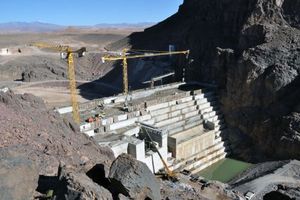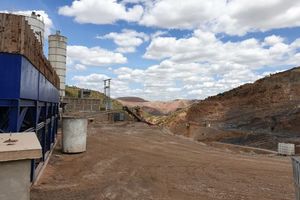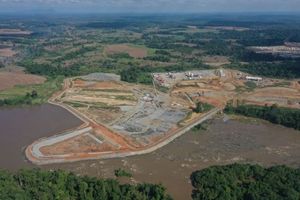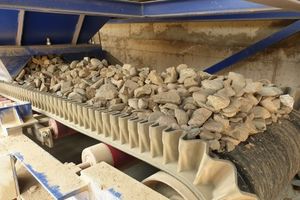BHS mixing plants in use for concrete dams in Morocco and Cameroon
Concrete used in the construction of dams has to meet the most stringent requirements: it must withstand immense water pressure while at the same time being flexible enough to defy natural disasters. Producing concrete of this class requires high-quality mixing technology.
International players such as Société générale des travaux du Maroc (SGTM), the Société de Travaux Agricoles Marocaine (STAM) and the Nachtigal Hydro Power Company (NHPC) rely on mixing plants from BHS-Sonthofen for their concrete dam projects. The mixers used in Morocco and Cameroon continuously produce large quantities of RCC (Roller Compacted Concrete) to ensure completion of the infrastructure-relevant dam projects.
Three large dams under construction in Morocco
Morocco's water demand is rising continuously. In order to forestall the threat of a drinking water deficit in 2030, the Moroccan authorities have initiated various construction projects for water reservoirs. One of these is the Tiddas Dam in the Khemisset region, which will be one of the country's largest dams when completed. With a capacity of around 592 million cubic meters and a cost equivalent to around 100 million euros, the Tiddas Dam is intended to secure the drinking water supply for Casablanca and Rabbat in the future.
“The demands on concrete for the Tiddas Dam are high,” explains Hans Traut, Area Sales Manager Building Material Machinery at BHS-Sonthofen. “RCC concrete has a very low cement content, which makes it cost-effective but also very stiff.” Therefore, RCC cannot be pumped, but is brought in via conveyor belts and then compacted with rollers. Conventional, water-impermeable concrete is also used on the dam’s water side.
BHS supplied the complete MPL continuous mixing plant for processing the RCC, including the proven BHS twin-shaft continuous mixer of type LFK 9026 and sophisticated weighing, batching, and control technology.Traut comments, “The twin-shaft continuous mixer is a powerful, reliable solution for continuous mixing processes, especially with coarser grain content, as used for dam concrete.” The BHS mixing plant can produce up to 300 cubic meters of concrete per hour. “In addition, the mixing plant is unbeatable in its batching accuracy,” Traut continues.
For another dam project in Tinghir Province, contractor STAM purchased a used BHS continuous mixing plant refurbished with original spare parts. The Toudgha Dam is used for flood protection of the Toudgha Gorges, as well as for irrigation of agricultural land downstream. The continuous mixing plant has now been in operation since 2019.
Nightingale Dam Project on the Sanaga River
The Nachtigal dam project in Cameroon is being built on the middle reaches of the Sanaga River northeast of the capital Yaoundé and is expected to be commissioned in 2023. It consists of roller compacted concrete dams, a headrace channel, a power plant with seven generating units, a substation and a transmission line. For the construction of this strategically important dam, BHS also supplied a complete continuous mixing plant with a twin-shaft continuous mixer type LFK 0926. “The robust and maintenance-friendly design of the LFK continuous mixer enables cost-effective and at the same time fast mass production of RCC with consistently high mixing quality,” says Traut.
Our experts are always available for process consulting and technical questions. You can find more information on our website




